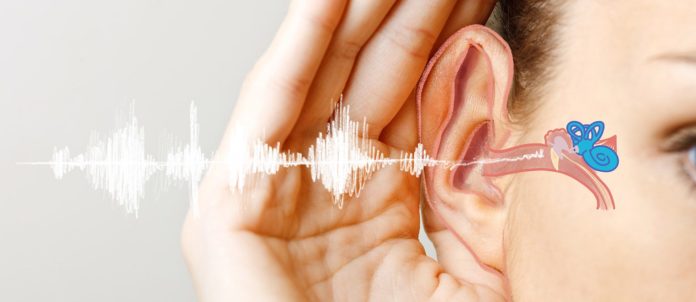According to the World Health Organization, “a person who is not able to hear as well as someone with normal hearing—hearing thresholds of 25 dB or better in both ears—is said to have hearing loss.” Hearing loss can occur in one ear or both ears in advanced cases, and this may impair speech and conversation.
Individuals who have trouble hearing can benefit from the use of closed captions and hearing aids, while those with advanced hearing loss can from cochlear implants. Deafness is a result of severe hearing loss, and often people who are deaf cannot hear anything. Keep reading for common types of hearing loss and how to manage their symptoms.
1. Conductive Hearing Loss

This hearing loss happens when damage in the outer ear or in the ear canal inhibits sound transmission to the brain. This results from an earwax buildup, ear infection, or osteoporosis. In some cases, individuals are born without an ear canal or malformed ear shape, and this too can result in conductive hearing loss. Treatment for conductive hearing loss involves surgery, medication, or a combination of both.
If you or a loved one are looking for hearing help or additional auditory resources, Hearing Health USA can help. They are an autonomous audiology group of hearing centers based in the United States with a network of over 200 hearing care clinics. Their clinics are managed by hearing professionals and offer access to affordable hearing care technology, professional hearing care services, as well as telehealth hearing tests and consultations.
Ranked among the top 50 healthcare providers in the country in 2019 by International Forum on Advancements in Healthcare (IFAH), the Hearing Health USA Family is devoted to providing high-quality hearing care services and unsurpassed care to their patients daily. With clinics across the country, make an appointment with them at your preferred location.
2. Sensorineural Hearing Loss

This is is a permanent hearing impairment that also happens to be the most common hearing problem. Damage to the auditory nerves causes them to weaken and block, making it impossible to transfer nerve signals to the brain. Consequently, this blockage in the auditory nerves inhibits the transfer of sensory information like sound volume and sound clarity to the brain. When this happens, an individual suffers from sensorineural hearing loss.
When a child is born with a sensorineural hearing problem, it may be genetic or acquired through an infection transferred from mother to child in utero. Where sensorineural hearing loss develops because of aging (presbycusis) it can be offset by a variety of triggers such as exposure to loud noise, medication side effects, infectious diseases, dementia, and cardiovascular disease.
An audiologist can conduct a complete hearing test to gauge your sensitivity to sound and confirm that you suffer from this specific hearing impairment. To promote better hearing, a hearing specialist may recommend hearing aids.
3. Mixed Hearing Loss

This hearing impairment results from presenting symptoms of both sensorineural and conductive hearing loss. The symptoms presented here may be short-term, while others could be permanent. An individual suffering from conductive hearing loss may be able to have these symptoms treated, while the symptoms of the sensorineural hearing impairment persist.
4. Neural Hearing Loss

This hearing problem occurs because of damage to the auditory nerve. Hearing solutions like cochlear implants and hearing aids will not remedy this hearing problem due to the absence of auditory nerves to send sound frequencies to the brain.
To remedy this hearing problem, an auditory brainstem implant is inserted into the patient’s inner ear. It works by amplifying ambient sound because natural hearing is impossible to achieve. This implant also makes it possible for the wearer to lip-read.

















